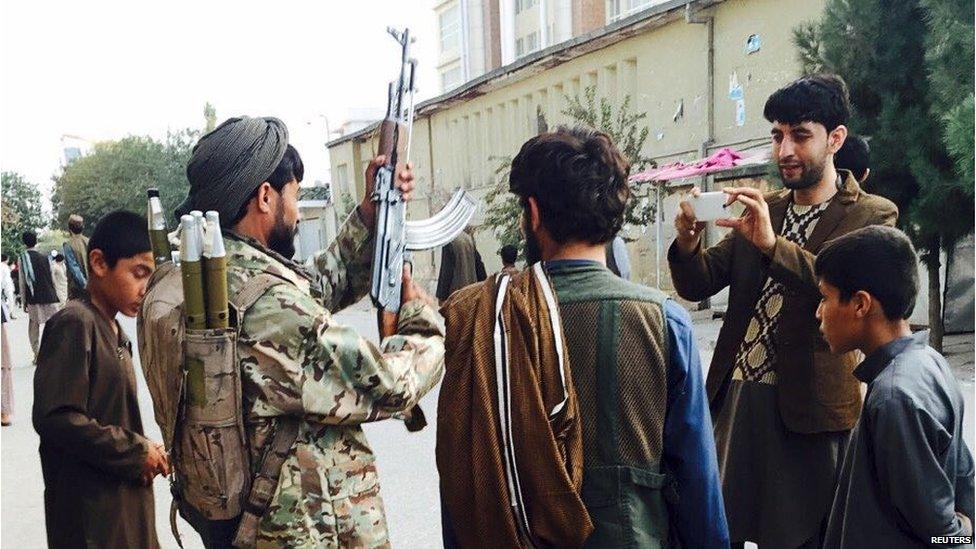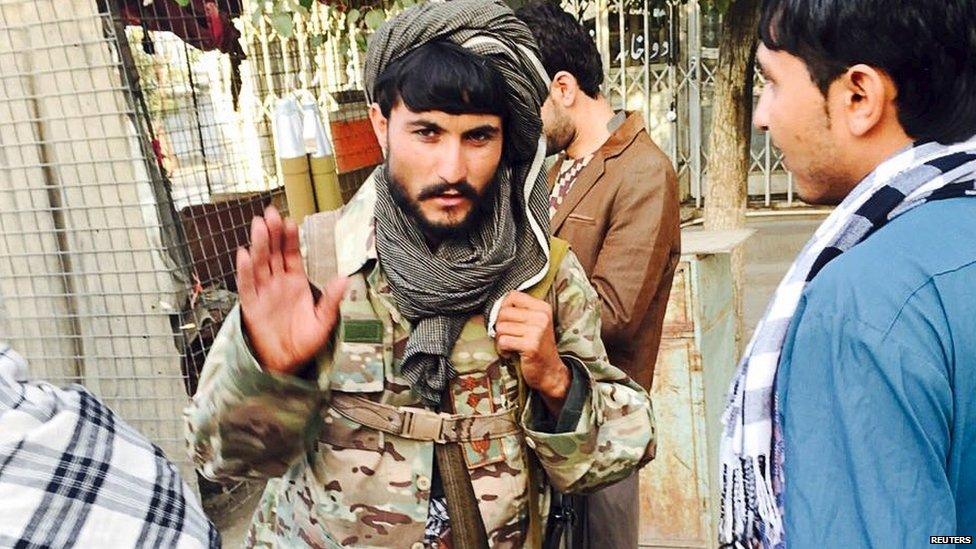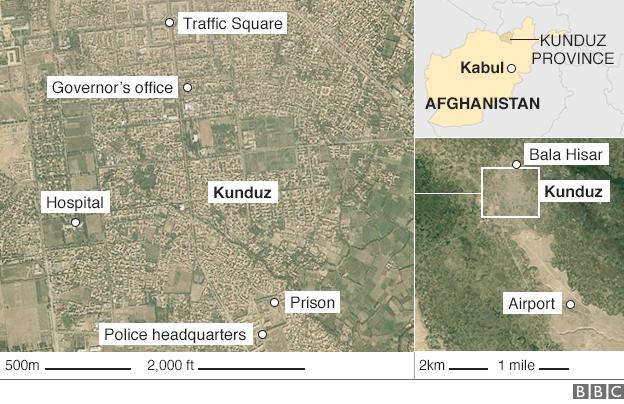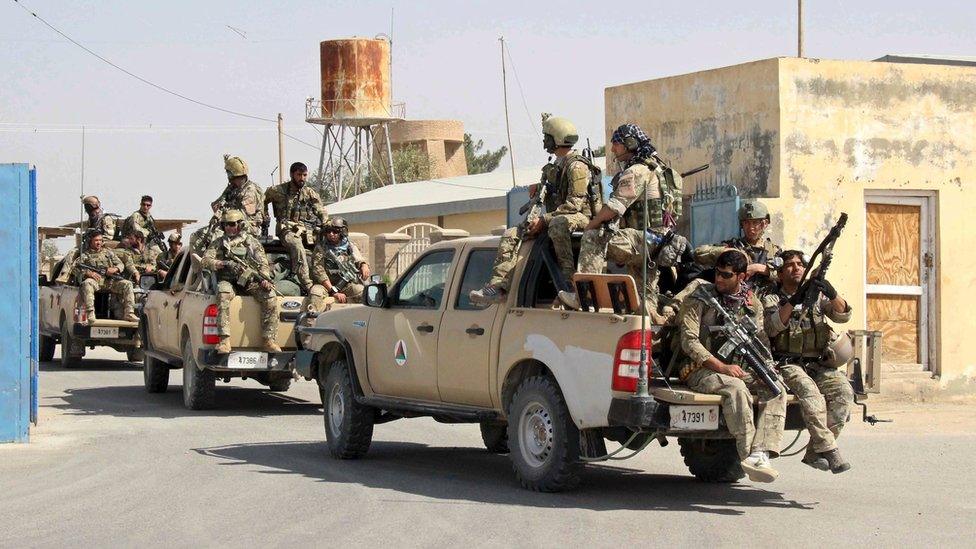Taliban tighten grip on Afghan city of Kunduz
- Published

Taliban fighters have been out on the streets of Kunduz
Taliban fighters have seized a military hilltop site in Kunduz, tightening their grip on the northern Afghan city.
The capture of the Bala Hisar fortress came despite efforts by government reinforcements, backed by Nato airstrikes and special forces, to retake the city.
They are now battling to keep the airport, the army's last stronghold.
The Taliban over-ran the city of 300,000 people on Monday, their biggest gain since losing power in 2001.
The Taliban had blockaded the Bala Hisar fortress for two days.
The nearly 200 Afghan security personnel then abandoned the position after running out of food and ammunition, an Afghan security official told Reuters.
Late on Tuesday, the Taliban tried to capture the airport as well, but US air strikes and coalition special forces halted their advance.
A special forces commander said the foreign troops - who are in Kunduz in a non-combat role - had acted in "self-defence".
On Wednesday, hundreds of Afghan troops were delayed as they approached Kunduz, due to a Taliban ambush and time taken to remove explosives from roads.
Afghanistan's health ministry said more than 40 people had been killed, external and more than 330 injured in the fighting, the vast majority of them civilians.

Win-win for the Taliban - Dawood Azami, BBC World Service

The fall of Kunduz is a propaganda coup for the Taliban
The fall of Kunduz is a win-win for the Taliban, whatever happens now. Even if the insurgents are expelled in the army counter-offensive, they will leave with both booty and publicity.
Taliban fighters emptied the coffers of banks in Kunduz, seized weapons, including armed vehicles, and also gained a propaganda victory.
The seizure of one of Afghanistan's most strategic and richest cities has also increased the prestige of new Taliban leader, Mullah Mansour - those within the insurgent group will see him as someone who can deliver impressive victories on the battlefield.
Victory also reasserts Taliban control amid competition from the Islamic State group, which has been challenging the Taliban's supremacy in many parts of the country.
The fact that a few hundred Taliban fighters defeated thousands of Afghan security forces is also embarrassing for the National Unity Government in Kabul, especially when the assault coincided with the first anniversary of its formation.

Read more on the battle for Kunduz
The significance of Kunduz lies in its strategic location at the centre of drug-smuggling routes
Taliban overrun Kunduz Images of how the Taliban suddenly overwhelmed the city
Mullah Mansour's battle to be Taliban leader After all the disagreements, the Taliban says it has rallied around its new leader
Who are the Taliban? A guide to the complexities and conflicts within the militant group

Kunduz is one of Afghanistan's largest cities, and is strategically important as a transport hub for the north of the country.
Militant violence has increased across Afghanistan since Nato ended its combat mission in Afghanistan in December, leaving a 13,000-strong residual force used for training and counter-terrorism operations.
Fighting has been going on in a number of other areas:
In neighbouring Baghlan province a former Nato base was reported to be under attack, external, while government forces had been blocked by Taliban-laid mines
Reports speak of fighting in several districts in Takhar province,, external to the east of Kunduz
The Taliban say they have taken a district in western Farah province
The BBC's Dawood Azami says the Taliban are now trying to open multiple fronts to divert the attention of the Afghan military from Kunduz and stretch them thin.
On Tuesday the United States acknowledged the seizure of Kunduz as a setback, but said it remained confident that Afghan security forces could retake the city.
Sayed Sarwar Hussaini, a spokesman for Kunduz's police chief, told Reuters: "Hundreds of Taliban are killed and their dead bodies are on [the] streets."
There was no independent confirmation, and the Taliban denied their local leader had been killed.

Residents, nervous of both the Taliban and the possibility of street-fighting, are largely staying indoors.
An Afghan MP, Dr Fatima Aziz, told the BBC she fled the city with her children, coming under fire from the Taliban as she escaped.
"I'm very worried for my people," she said.
The Taliban's new leader, Mullah Akhtar Mansour, said the government should admit defeat.
In Kabul, members of parliament called for President Ghani to resign. The head of Afghan intelligence was called to parliament to explain what went wrong in Kunduz.
The BBC's Waheed Massoud says the fall of Kunduz is of "enormous and symbolic" importance to the Taliban
The assault on Monday was swift and took Afghan forces by surprise.
As darkness fell, heavily armed fighters crossed fields to attack the city from multiple directions.
They quickly overwhelmed several of the police checkpoints defending the perimeter of the town before moving into the centre.
Kunduz province has seen a number of attacks since April, with the Taliban joining forces with other insurgents.

Officials said thousands of special forces were preparing to retake the city